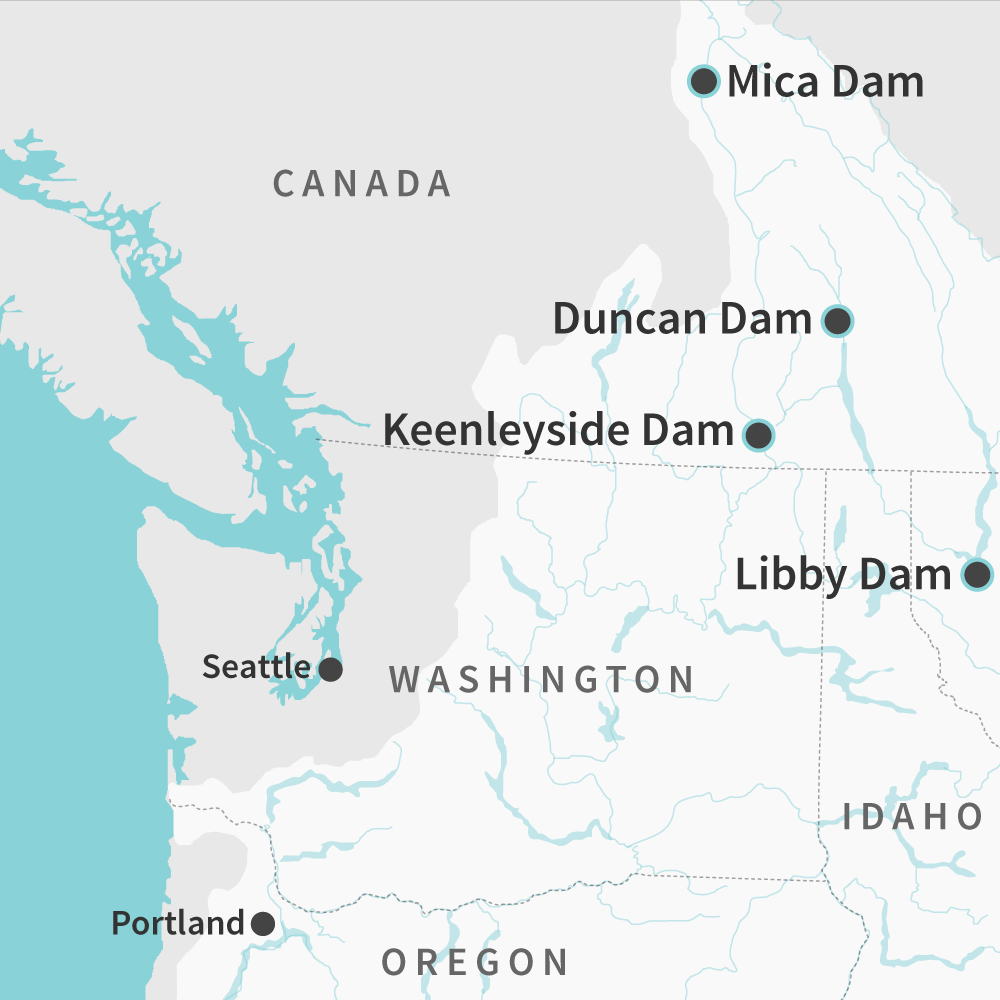For every day that goes by, electricity users in the Pacific Northwest pay more than they should, amounting to hundreds of millions of dollars a year.
But nearly 2-1/2 years after a negotiating team offered recommendations to modernize a treaty between the U.S. and Canada that could bring relief to those ratepayers, the State Department has yet to open talks with its neighbors to the north.
COLUMBIA RIVER DAMS
“Failure to act causes a significant potential loss to the Northwest region of approximately $1 million every two to three days,” according to the Portland, Oregon-based Public Power Council.
Welcome to the complicated intersection of international diplomacy and river policy.
In 1964, the U.S. and Canada signed the Columbia River Treaty, controlling the flow of the powerful river to alleviate flooding and adding four dams to provide new hydropower for industrial expansion.
It calls on the U.S. to provide hydropower benefits to Canada—called the “Canadian Entitlement”—in connection with the construction of three dams and increased storage in that country.
The costs of that power—put at $250 million to $350 million a year—are paid by customers of Bonneville Power Administration, including electric cooperatives, and Mid-Columbia public utility districts.
The pact allowed either country to terminate some provisions of the treaty as early as September 2024 with 10 years advance notice, and some utilities say they’re ready to consider that option when it comes to the Canadian Entitlement.
“Since September 16, 2014 the United States has had the right to give notice under Article XIX of the Columbia River Treaty to terminate the Entitlement provisions of the Treaty but has elected not to issue such notice,” a group of PUDs wrote earlier this year to U.S. officials.
“The United States should not expect the region’s electric customers to continue payment of the Entitlement under the current terms after September 15, 2024, when the United States has full knowledge the payment is out of balance with the benefit received.”
The State Department has said only that it has the matter under review, two year after the entire Northwest congressional delegation first urged President Obama to initiate negotiations.
Sen. Maria Cantwell, D-Wash., said after a meeting with Canadian Prime Minister Justin Trudeau that Canada is ready to move ahead with talks.
Disaster and Endangered Fish
Hydropower generation has become a major concern in any revised treaty, but utilities also want to make sure hydro and a second purpose of the treaty—flood control—are not outweighed by new environmental approaches.
Initial treaty discussions picked up momentum in 1948, following Columbia River flooding that wiped out Oregon’s second largest city.
On May 30, 1948, Ed Grohs, a deputy with the Multnomah County, Oregon, Sheriff’s Office, was in his patrol car with his partner as he witnessed the catastrophe.
“The ground seemed to tremble and melt,” Grohs recalled to a reporter 30 years later. “There was a sudden wave of swollen mud and then a torrent that frothed with debris and waves.”
Within 10 minutes after a dike broke, the raging Columbia River washed over Vanport, once home to 40,000 people, killing 15 and leaving thousands homeless. So complete was the damage that the federal and state government never rebuilt Vanport, originally designed as a massive wartime housing development outside of Portland.
“There will be no more flooding of the Lower Columbia, as happened at Vanport in 1948,” U.S. Sens. Warren Magnuson and Henry Jackson, both Washington Democrats, said in 1964, when the treaty was signed.
Now, though, there are concerns that the treaty could be expanded to a third primary function— ecosystem issues, particularly the survival rate of endangered juvenile salmon, a sensitive subject in the Northwest.
The Public Power Council has noted that extensive efforts to promote fish and wildlife are already underway in the Columbia River Basin.
“It is critical that ecosystem measures discussed in the Treaty context are limited to issues truly international in scope. As with other regional efforts, ecosystem measures must be based on sound science, be subject to cost and benefit analysis, provide practicable, measurable outcomes, and not adversely impact electric system reliability or irrigation needs,” the council said.
Steven Johnson is a staff writer at NRECA.
